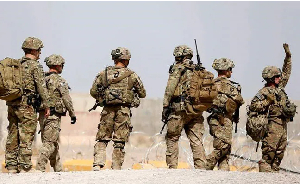Business News of Wednesday, 8 October 2008
Source: GNA
WB: Developing nations face convergence of food, fuel, financial crises
Accra, Oct. 8, GNA - Developing nations face a sudden convergence of food, fuel and financial crises as development and finance ministers gather for the World Bank and International Monetary Fund Annual Meetings on October 13.
Countries already suffering food and fuel price inflation may now also see declines in exports, trade and investment as a result of financial turmoil that is becoming increasingly global, World Bank President Robert B. Zoellick said in a statement issued by the World Bank.
"While people in the developed world are focused on the financial crisis, many forget that a human crisis is rapidly unfolding in developing countries. It is pushing poor people to the brink of survival," says Zoellick.
"The financial crisis will only make it more difficult for developing countries to protect their most vulnerable people from the impact of rising food and fuel costs."
The number of malnourished people globally will grow by 44 million, to 967 million, in 2008, after several countries experienced double-digit food inflation, according to a new World Bank report. The report, Rising Food and Fuel Prices: Addressing the Risks to Future Generations, is one of several being released just prior to the Annual Meetings that reveal a changing economic landscape after years of steady economic growth and poverty reduction worldwide. Referring to what the World Bank was doing on food, it said total Global Food Response Program (GFRP) projects amounted to US$851 million in 32 countries as of October 2.
As of the same date, GRFP had disbursed US$188 million to 19 countries. The money is used to feed poor children and other vulnerable groups, provide for nutritional supplements to pregnant women, lactating mothers, infants and small children, to meet additional expenses of food imports or to buy seeds for the new season.
"GFPR is providing US$130 million to Bangladesh and $200 million to Philippines in the coming months to help address the food crisis. Beyond GRFP funds, the Bank is approving US$90 million in IDA funding for food projects in Ghana, Burkina Faso, Eritrea, Malawi, Burundi and Togo and Madagascar. The Bank is also boosting overall agricultural lending to $6 billion over the next year."
"The events of this year are a wake-up call," Zoellick said in a pre-Meetings address October 6. "The international architecture designed to deal with such circumstances is creaking." The world needs a new "multilateral network for a new global economy" with a steering group that includes the G7 and the rising powers of Brazil, China, India, Mexico, Russia, Saudi Arabia and South Africa, he said.
Zoellick warned the financial events of September, including the collapse or near-collapse of major banks, could be a "tipping point for many developing countries."
"The stark reality is that developing countries must prepare for a drop in trade, capital flows, remittances, and domestic investment, as well as a slowdown in growth," he said.
High food and fuel prices and food shortages hit several countries early this year, leading to riots, hardships, and malnutrition. Zoellick said in response, the Bank created a US$1.2 billion rapid financing facility and called for a New Deal for a Global Food Policy to promote agricultural development and food security in Africa. The Bank's Global Food Response Program has disbursed $188 million in 19 countries as of October 2, with US$663 million earmarked for another 13 countries.
But Zoellick said the international aid system was not keeping pace with the growing needs. The G7 as a whole is behind on fulfilling aid pledges made at the 2005 G7 Gleneagles Summit.
He said a new multilateral network would build a sense of shared responsibility for the health of the global political economy, including climate change, a key topic for discussion at the upcoming Annual Meetings, and stabilizing fragile and post-conflict states. "We need this mechanism so that countries are not left to fail - with all the human, economic, and political consequences this entails for both them and their neighbours. We need it so that global problems are not just mopped up after the fact, but anticipated. We need it to develop the habit of dialogue and the necessary relationships of trust before the crisis hits. We need it to shape multilateral solutions," Zoellick said.










